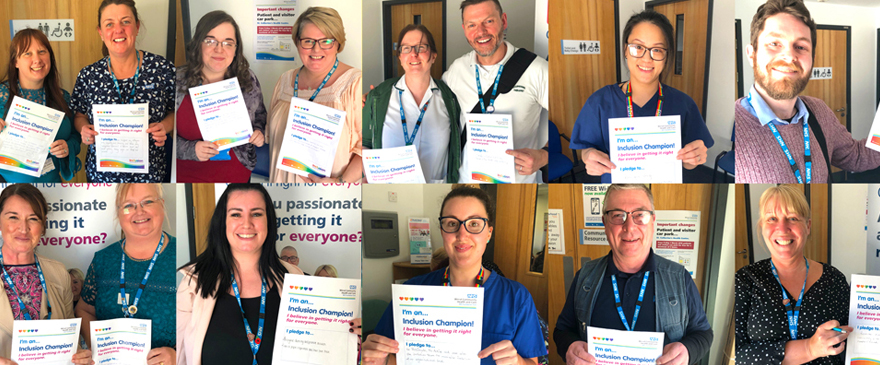Inclusion – ‘Getting it right for everyone’

We want to ensure that the people we care for and our staff are treated fairly, equally and with respect.
We want to be an organisation that:
- people continue to trust
- values differences
- reflects the communities we serve
We want to support our staff to embed a culture committed to ‘getting it right for everyone’.
‘Inclusion’ underpins our vision to be the outstanding provider of high quality, integrated care to the communities we serve. With our commitment to Inclusion we continue to promote and provide services to all community groups across Wirral and Cheshire East, ensuring we reach everyone in a way that is right for them. This includes our own staff who have protected characteristics, potential vulnerabilities or those who need additional support.
We have developed a list of pledges which we promote across all of our services. Our pledges promote our passion of person centered care and demonstrate our approach to Inclusion.
We are committed to:
- valuing the strength that comes with difference and the positive contribution that diversity brings
- promoting a fair and welcoming organisation, celebrating difference to ensure our workforce are all valued and treated equally
- addressing discrimination and inequalities within our local communities, and understanding and eliminating barriers that prevent access to our services
- recognising the diversity within our communities and being responsive to people’s needs
- engaging with our local communities and stakeholders to promote Inclusion and share our learning to further develop our thinking together
Our commitment to Inclusion – a Trust wide approach

We have a dedicated Inclusion Team who steer the organisation’s Inclusion agenda. The team is supported by over 60 Inclusion Staff Champions from services across the organisation, all of whom are passionate and dedicated to making sure we are providing individualised care to all members of our communities. Champions also support staff.
Inclusion runs throughout the organisation on all levels and people visiting St Catherine’s Health Centre are reminded of this as they walk in via the entrance.
Who helps and guides us to get it right for everyone and how are we assured?
We have a legal duty under the Equality Act 2010 to promote equality of opportunity, foster good relations and eliminate harassment and discrimination.
As part of our legal duty we must prepare and publish annually an equality profile of our patients to gain a better understanding of the equality issues in service delivery. In particular, the aim is to identify any under-representation of access to key services.
Our Inclusion Strategy has been developed in consultation with staff, the people we care for and local community organisations. It sets out how we are going to meet our legal duties under the Equality Act 2010 for all of the people we care for and all of our workforce, and ensures we support potentially vulnerable groups.
The nine protected characteristics:
- Age
- Race
- Disability
- Sex
- Gender Reassignment
- Sexual Orientation
- Religion and Belief or lack of
- Marriage and Civil Partnership
- Pregnancy and Maternity
We’re committed to working closely with people with vulnerabilities and those who may need additional help and support, or those who experience barriers to accessing healthcare eg travelling community, those who are socially isolated or homeless, drug or alcohol users and sex workers.
Feedback from members of the public or service users help steer any changes across the organisation to ensure protected groups have access to the services they need.
Inclusion Partnership Forum
We’re committed to working closely with people with protected characteristics , vulnerabilities and those who may need additional help and support or who experience barriers to accessing healthcare eg carers, travelling community, those who are socially isolated or homeless, drug or alcohol users and sex workers.
The forum meets every other month to discuss a wide range of subjects and topics relating to local health and wellbeing needs, as well as gathering valuable intelligence and feedback from local communities.
It’s led by the Inclusion Team and is a really valuable group to champion change, support networks and links with local communities. It allows agencies who represent local community groups to come together to discuss and share ideas and focus on improvements and solutions. This assures we are listening and responding effectively.
How are we assessed?
EDS2 is an Equality Delivery System, a tool designed to help NHS organisations, in partnership with local people, to review and improve how they perform for people with characteristics protected by the Equality Act 2010.
A key value of the NHS is that ‘everyone counts’, so EDS2 allows anyone involved with the NHS; patients, carers, voluntary organisations and staff, to rate an organisation’s equality performance and contribute to how they can make it better and how they can get to where they want to be.
You can view the Equality Delivery System Report (EDS) 2024-25.
About EDS2
The tool:
- can be a real force for good by showing organisations where to put their effort and resources in order to make a real difference to people.
- is based on involvement of staff, patients and diverse communities and we know often it is the lack of engagement with different groups that can lead to mis-understandings and complaints.
- will help to bring issues and concerns expressed by staff to the fore. In addition, annual reporting as part of EDS2 commitment to transparency regarding complaints and reduction in complaints from staff will also assist in ensuring the NHS progresses on tackling racism and discrimination.
- is not about political correctness. It’s about ensuring the services we deliver meet the needs of everyone. It’s about ‘making sure everyone counts’. In fact, you cannot have anything more fundamental to the way the NHS goes about its day-to-day business.
Each year we work with a Community Equality Panel made up of trained or experienced members of the local community, partner agencies, services and Trust staff, all who have a specific understanding of the needs of people identified by the Equality Act 2010 as being at the most risk of discrimination.
The panel is a supportive and vital resource which enables us to understand the barriers that users and potential users of our services may be facing. With the support of the panel members, we are able to develop greater awareness, which allows us to respond to people’s needs and provide a better experience.
Members of the forum are also key panel members and enable us to reach the wider communities.
Bi-monthly meetings support us to:
- consider progress and review actions
- identify any gaps and suggest ways for improvement
- raise any concerns or barriers to equality
- increase understanding of local need based upon local intelligence
Community panels and forum members work in partnership with the Trust and are able to promote Inclusion and raise awareness, helping us to improve quality and access to services for people from across the nine protected characteristics. All of this supports the annual EDS2 assessment review prior to submission to Healthwatch.
What we aim to gain from EDS2?
Better health outcomes
- Services are designed and delivered to meet the health needs of local communities
- People’s health needs are assessed and met in appropriate and effective ways
- Transitions from one service to another, for people on care pathways, are made smoothly with everyone well-informed
- When people use NHS services their safety is prioritised and they are free from mistakes, mistreatment and abuse
- Screening, vaccination and other health promotion services reach and benefit all local communities
Improved patient access and experience
- People, carers and communities can readily access hospital, community health or primary care services and should not be denied access on unreasonable grounds
- People are informed and supported to be as involved as they wish to be in decisions about their care
- People report positive experiences of the NHS
- People’s complaints about services are handled respectfully and efficiently
A representative and supported workforce
- Fair NHS recruitment and selection processes lead to a more representative workforce at all levels
- The NHS is committed to equal pay for work of equal value and expects employers to use equal pay audits to help fulfil their legal obligations
- Training and development opportunities are taken up and positively evaluated by all staff
- When at work, staff are free from abuse, harassment, bullying and violence from any source
- Flexible working options are available to all staff consistent with the needs of the service and the way people lead their lives
- Staff report positive experiences of their membership of the workforce
Progress is reported to the Board of Directors on a quarterly basis, and will be submitted to Healthwatch Wirral annually for its comments and external grading.
Accessible Information Standard (AIS) – assuring us of the communication needs of our patients, clients and communities
The Accessible Information Standard aims to make sure that people who have a disability, impairment or sensory loss get information that they can access and understand, and any communication support that they need from health and care services.
The standard helps organisations like ours to ensure that patients and service users, along with those who care for them, can access and understand the information we give to them. This includes making sure that people get information in accessible formats.
By law (section 250 of the Health and Social Care Act 2012), all organisations that provide NHS care or adult social care must follow the standard in full.
As part of the Accessible Information Standard, organisations that provide NHS care or adult social care must do five things. They must:
- Ask people if they have any information or communication needs and find out how to meet their needs.
- Record those needs clearly and in a set way.
- Highlight or flag the person’s file or notes so it is clear that they have information or communication needs and how to meet those needs.
- Share information about people’s information and communication needs with other providers of NHS and adult social care, when they have consent or permission to do so.
- Take steps to ensure that people receive information which they can access and understand and receive communication support if they need it.
Our AIS action plan give assurance across the Trust that all services adhere to the standards set out. It’s led by the Inclusion Team with input from the Inclusion Champions, Communications and Marketing Team, IT and Business Intelligence Teams.
The data we collect allows us to see who is using our services and what communication needs there are within our communities.
Interpretation, translation and accessibility services
Interpretation, translation and accessibility services, including British Sign Language (BSL), can be booked in advance and free of charge for patients. If you or someone you care for receives an appointment and needs help, please contact the clinic to arrange this.
Our Walk-in Centres and Unplanned Care Services offer language interpretation services via a telephone line or BSL support.